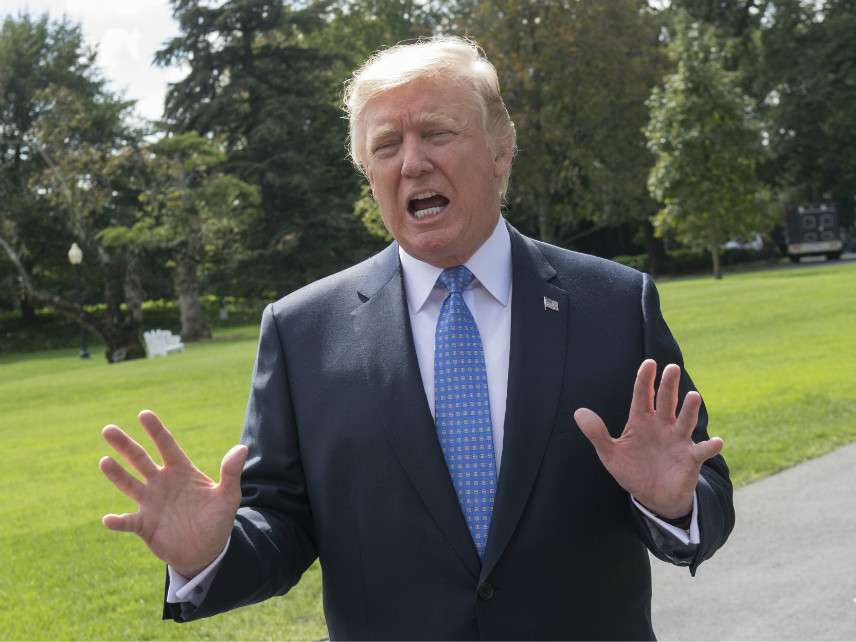In Stunning Reversal, Trump Gives Up on Private Sector Infrastructure Investments
Libertarians have increasingly little to like about his presidency.

Infrastructure was one of the few areas where a Donald Trump presidency offered any cause for optimism among libertarians.
On the campaign trail and in office, Trump had promised to tap private capital to deliver $1 trillion in infrastructure investments, spin off the nation's air traffic control system from direct federal management, and pump the breaks on the billions in federal pork currently wasted on local transit projects.
None of this has happened.
Despite his self-proclaimed skill at deal-making, the president has so far failed to shepherd air traffic control reform through a reluctant Congress. His Department of Transportation has continued to greenlight spending on rail boondoggles, including California's high-speed rail disaster.
And now, in a stunning reversal of pretty much everything he has said over the past year, Trump is abandoning the idea of tapping private investment capital for his trillion-dollar infrastructure dream.
According to a Tuesday Washington Post report, Trump told congressional Democrats in a closed-door meeting he was abandoning plans to employ public-private partnerships for infrastructure investment preferring, instead, the old-fashioned tax, borrow, and spend method.
"He dismissed it categorically and said it doesn't work," said Rep. Brian Higgins (D – New York), who was in the meeting with Trump. A White House Official later confirmed this, telling the Post that private investment was "not the silver bullet for all of our nation's infrastructure problems."
"I was both astonished and dismayed," says Bob Poole, director of transportation policy for the Reason Foundation, which publishes this website. "Everything the administration had said up until yesterday was that public private partnerships and private investment in infrastructure improvements was going to be the core of the program."
Trump's campaign first endorsed making use of private dollars for infrastructure spending in an October 2016 white paper. Trump's 2018 budget proposal lists "leveraging the private sector" as one of four key principles for infrastructure. Trump has personally advocated for the idea in public speeches and pronouncements.
Yesterday's departure from this key principle makes meeting the president's goal of a $1 trillion investment in infrastructure impossible.
"There is not $1 trillion of federal money available," says Poole. "There is no way, no how that a trillion dollars of new spending over ten years is going to be enacted so long as Republicans have majorities."
Meanwhile, the country has pressing infrastructure needs. Nearly 44,000 miles of interstate highways are nearing or exceeding their 50-year design lives. Some 240,000 water mains break each year. And an estimated 58,495 bridges are structurally deficient.
Public-private partnerships offer the federal government, as well as states and localities, a way to address this problem without raising taxes or taking on debt. Private capital could be harnessed, with investors taking a return from the tolls, utility charges, and other user fees these projects generate.
Private spending, according to Poole, would also route money around a federal infrastructure funding system "so politicized that a lot of the investments are not in highest and best uses." Private sector money "would not go to bridges to nowhere, it would go to projects that actually could earn a return on investment," he says.
Until yesterday, Trump had promised, albeit in limited detail, to remove regulatory barriers to private investment infrastructure, while limiting the federal government's role in the whole process. So far, the White House has offered little explanation for the president's sudden reversal.
One possible reason is that Trump—short on any real legislative accomplishments—is desperate to get some part of his agenda through. The idea of greater private sector involvement is a poison pill for most on the left. This could be a way of soliciting Democratic support for his infrastructure plan.
It is also possible that the ever-mercurial Trump is just saying stuff.
"There have been so many bizarre statements that Trump has made that don't actually reflect policy," Poole says. "I hope it was just a throw-away set of statements but you never know. It's very hard to tell."
Whatever the explanation, we have a president stepping back from many of the free market and deregulatory ideas he pitched coming into office. It's a depressing takeaway for those who had hoped Trump might be better on this issue. And it leaves little room for optimism about any limited government reforms coming from this administration.
Rent Free is a weekly newsletter from Christian Britschgi on urbanism and the fight for less regulation, more housing, more property rights, and more freedom in America's cities.

Show Comments (150)